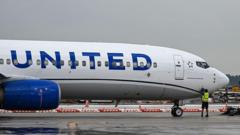Father Robert Prevost's ascent to the papacy signals a potential shift in the Roman Catholic Church amid global issues.
Pope Leo XIV: A New Era Begins for the Roman Catholic Church

Pope Leo XIV: A New Era Begins for the Roman Catholic Church
Discover the journey and challenges facing the newly elected Pope Leo XIV as he assumes the papacy.
In the early days of his papacy, Pope Leo XIV, formerly known as Father Robert Prevost, is poised to make significant waves as the 267th head of the Roman Catholic Church. A well-rounded figure who possesses deep religious knowledge and extensive pastoral experience, Prevost gained considerable recognition from Pope Francis, who endorsed him in the twilight of his papacy for his adept leadership capabilities.
His life story embodies resilience and commitment to social justice, especially during turbulent times in Peru, where he navigated dangerous situations armed only with his principles. In the mid-1990s, he boldly defended young seminarians against armed soldiers seeking to conscript them for military service, citing their exemption as clerics. These formative experiences have equipped him well to guide the Church through contemporary global challenges marked by authoritarianism, economic disparity, and the climate crisis.
With fluency in several languages and a solid grasp of Vatican bureaucracy, Pope Leo XIV stands as a bridge between different cultures. His tenure as a missionary in Peru shaped not only his character but also his progressive outlook for the Catholic Church's future. As his inauguration resonates from the balconies of St. Peter’s Basilica, the weight of expectations is colossal. Advocates of social change and those wary of the Church's role in the modern world eagerly anticipate how he will respond to crises that threaten vulnerable populations globally.
In this era of rapid technological advancement and rising threats, Pope Leo XIV's papacy represents both continuity and change, as he seeks to unify a divided Church while promoting dialogue and compassion in uncertain times.
His life story embodies resilience and commitment to social justice, especially during turbulent times in Peru, where he navigated dangerous situations armed only with his principles. In the mid-1990s, he boldly defended young seminarians against armed soldiers seeking to conscript them for military service, citing their exemption as clerics. These formative experiences have equipped him well to guide the Church through contemporary global challenges marked by authoritarianism, economic disparity, and the climate crisis.
With fluency in several languages and a solid grasp of Vatican bureaucracy, Pope Leo XIV stands as a bridge between different cultures. His tenure as a missionary in Peru shaped not only his character but also his progressive outlook for the Catholic Church's future. As his inauguration resonates from the balconies of St. Peter’s Basilica, the weight of expectations is colossal. Advocates of social change and those wary of the Church's role in the modern world eagerly anticipate how he will respond to crises that threaten vulnerable populations globally.
In this era of rapid technological advancement and rising threats, Pope Leo XIV's papacy represents both continuity and change, as he seeks to unify a divided Church while promoting dialogue and compassion in uncertain times.




















